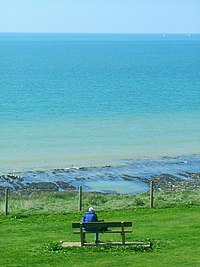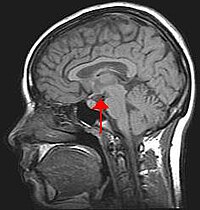
Etiology of the Broad Avoidant Restrictive Food Intake Disorder Phenotype in Swedish Twins Aged 6 to 12 Years
Sign Up to like & getrecommendations! Published in 2023 at "JAMA Psychiatry"
DOI: 10.1001/jamapsychiatry.2022.4612
Abstract: Key Points Question To what extent do genetic and environmental factors contribute to the liability to avoidant restrictive food intake disorder (ARFID)? Findings In this nationwide Swedish twin study including 16 951 twin pairs aged 6… read more here.
Keywords: etiology; aged years; avoidant restrictive; restrictive food ... See more keywords

Neuroendocrine Peptides of the Gut and Their Role in the Regulation of Food Intake.
Sign Up to like & getrecommendations! Published in 2021 at "Comprehensive Physiology"
DOI: 10.1002/cphy.c200007
Abstract: The regulation of food intake encompasses complex interplays between the gut and the brain. Among them, the gastrointestinal tract releases different peptides that communicate the metabolic state to specific nuclei in the hindbrain and the… read more here.
Keywords: peptides gut; food intake; neuroendocrine peptides; regulation food ... See more keywords

Ribociclib Bioavailability Is Not Affected by Gastric pH Changes or Food Intake: In Silico and Clinical Evaluations
Sign Up to like & getrecommendations! Published in 2018 at "Clinical Pharmacology and Therapeutics"
DOI: 10.1002/cpt.940
Abstract: Ribociclib (KISQALI), a cyclin‐dependent kinase 4/6 inhibitor approved for the first‐line treatment of HR+/HER2– advanced breast cancer with an aromatase inhibitor, is administered with no restrictions on concomitant gastric pH‐elevating agents or food intake. The… read more here.
Keywords: gastric changes; ribociclib bioavailability; food intake;

Children with avoidant/restrictive food intake disorder and anorexia nervosa in a tertiary care pediatric eating disorder program: A comparative study
Sign Up to like & getrecommendations! Published in 2019 at "International Journal of Eating Disorders"
DOI: 10.1002/eat.23027
Abstract: OBJECTIVE The purpose of this study was to examine the medical and psychological characteristics of children under the age of 13 years with avoidant restrictive food intake disorder (ARFID) and anorexia nervosa (AN) from a Canadian… read more here.
Keywords: eating disorder; disorder; avoidant restrictive; food intake ... See more keywords

Fasting induces astroglial plasticity in the olfactory bulb glomeruli of rats
Sign Up to like & getrecommendations! Published in 2018 at "Glia"
DOI: 10.1002/glia.23280
Abstract: The detection of food odors by the olfactory system, which plays a key role in regulating food intake and elaborating the hedonic value of food, is reciprocally influenced by the metabolic state. Fasting increases olfactory… read more here.
Keywords: olfactory; food intake; food; plasticity ... See more keywords

The influence of insulin on anticipation and consummatory reward to food intake: A functional imaging study on healthy normal weight and overweight subjects employing intranasal insulin delivery
Sign Up to like & getrecommendations! Published in 2022 at "Human Brain Mapping"
DOI: 10.1002/hbm.26019
Abstract: Aberrant responses within homeostatic, hedonic and cognitive systems contribute to poor appetite control in those with an overweight phenotype. The hedonic system incorporates limbic and meso‐limbic regions involved in learning and reward processing, as well… read more here.
Keywords: food; weight overweight; normal weight; food intake ... See more keywords

Administration of Alphitobius diaperinus or Tenebrio molitor before meals transiently increases food intake through enterohormone regulation in female rats
Sign Up to like & getrecommendations! Published in 2022 at "Journal of the Science of Food and Agriculture"
DOI: 10.1002/jsfa.12305
Abstract: Abstract BACKGROUND It has been previously shown that acutely administered insect Alphitobius diaperinus protein increases food intake in rats and modifies the ex vivo enterohormone secretory profile differently than beef or almond proteins. In this… read more here.
Keywords: food; enterohormone; increases food; administration alphitobius ... See more keywords

Secretin Links Brown Fat to Food Intake: New Perspectives for Targeting Energy Balance in Humans
Sign Up to like & getrecommendations! Published in 2019 at "Obesity"
DOI: 10.1002/oby.22477
Abstract: In 1902, Neumann referred to the concept of Luxuskonsumption in his habilitation thesis, essentially stating that we can dissipate excess nutritional energy as heat to keep slim: “On the other hand, we also know very… read more here.
Keywords: food intake; energy balance; brown fat; energy ... See more keywords

Selective stimulation of colonic L cells improves metabolic outcomes in mice
Sign Up to like & getrecommendations! Published in 2020 at "Diabetologia"
DOI: 10.1007/s00125-020-05149-w
Abstract: Aims/hypothesis Insulin-like peptide-5 (INSL5) is found only in distal colonic L cells, which co-express glucagon-like peptide-1 (GLP-1) and peptide YY (PYY). GLP-1 is a well-known insulin secretagogue, and GLP-1 and PYY are anorexigenic, whereas INSL5… read more here.
Keywords: stimulation; food intake; distal colonic; selective stimulation ... See more keywords

Phenotypic plasticity following weaning: winter body mass trends and food intake in relation to temperature by an arctic ungulate
Sign Up to like & getrecommendations! Published in 2020 at "Polar Biology"
DOI: 10.1007/s00300-020-02623-4
Abstract: Our knowledge is limited on how weaned mammals adjust to environmental events in the absence of maternal assistance in the polar north. With the expectation that weaned offspring should express the adaptive potential of the… read more here.
Keywords: body mass; food intake; temperature; body ... See more keywords

Effect of food-related behavioral activation therapy on food intake and the environmental impact of the diet: results from the MooDFOOD prevention trial
Sign Up to like & getrecommendations! Published in 2019 at "European Journal of Nutrition"
DOI: 10.1007/s00394-019-02106-1
Abstract: Food-based dietary guidelines are proposed to not only improve diet quality, but to also reduce the environmental impact of diets. The aim of our study was to investigate whether food-related behavioral activation therapy (F-BA) applying… read more here.
Keywords: food intake; food related; environmental impact; day ... See more keywords